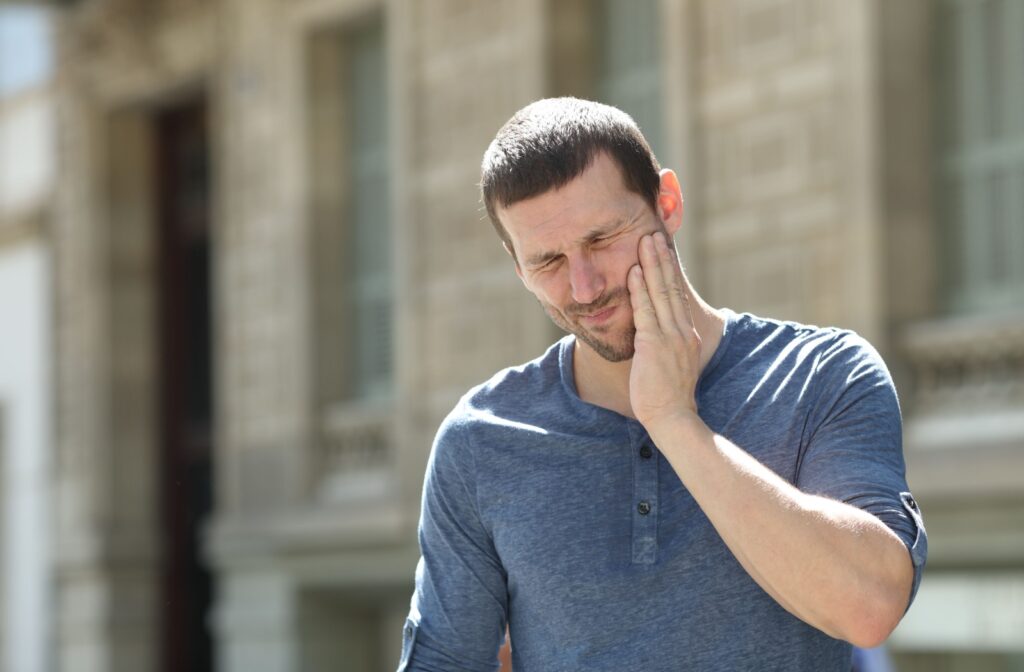Many different issues can cause tooth pain. But one often-overlooked condition is temporomandibular joint disorder, referred to as TMJ or TMD. It can be uncomfortable and often causes discomfort in the jaw. But can TMJ cause your teeth to hurt?
TMJ can cause tooth pain because it causes inflammation in the jaw. This can lead to muscle pains and minor spasms in the area and can cause radiating pain that feels like it’s occurring in nearby teeth.
What Is TMJ?
The temporomandibular joint is the joint that directly connects the jawbone to the skull. This joint lets you open and close your mouth, chew, and speak. When a problem develops with this joint, it can lead to inflammation in the area.
These problems are often referred to as TMJ because they affect the temporomandibular joint. This can be caused by anything that puts stress on this joint, including:
- Jaw misalignment
- Teeth grinding
- Stress
- Arthritis
TMJ Symptoms & Signs
When you develop TMJ, it can cause discomfort and inflammation. The joint may get irritated, and this can begin spreading to the surrounding muscles and nerves. Eventually, you may experience:
- Jaw pain or tenderness
- Clicking or popping sounds when opening or closing your mouth
- Difficulty or discomfort while chewing
- Earache or ringing in the ears
- Headaches or migraines
- Facial muscle pain or spasms
Sometimes, this can lead to tooth pain in the area. When this joint is misaligned, it puts unnatural pressure on the teeth and causes them to align incorrectly as well. This can lead to significant discomfort and pain.
This can even lead to the enamel of your teeth becoming exposed to unusual wear and tear, which can begin damaging the enamel; this reveals the dentin layer under the tooth and makes teeth much more sensitive. This can then lead to further pain in the teeth if you leave it untreated.
The Difference Between TMJ & Tooth Pain
Even though both often cause soreness and radiating feelings of discomfort, there are some key differences between TMJ and regular tooth pain.
With TMJ, your jaw is inflamed and irritated. This can lead to muscle spasms, headaches, and significant discomfort while chewing or speaking. The joint itself is in distress, and the symptoms are indications that something is wrong.
With regular tooth pain, however, the pain is often more centralized, usually around a single tooth, or several if more than one tooth is damaged. This pain can radiate downward toward the jaw through the root of the tooth itself. This then can lead to further irritation under the tooth, causing TMJ-like symptoms.
In either situation, it’s essential to speak with a dental professional to discuss treatment so you can find relief.
Tooth Pain & TMJ
If you notice tooth pain and are experiencing other TMJ symptoms, don’t ignore it immediately. Pain in the teeth can be an indication that something is wrong. So it can help to inspect the pained tooth and look for:
- Chips
- Stains
- Cracks
- Any visible sign of damage
You may have a problem with the tooth itself if you notice any of these. If you notice any physical damage to your teeth, visit your dentist as soon as you can to discuss treatment.
Often, cavities, fractures and infections are not visible to the naked eye or on your physical tooth, but with our technology we are able to delve in deeper and help diagnose your specific symptoms.

What Can Cause Tooth Pain?
You might be dealing with another condition if you notice any visible damage. One of the most common causes of tooth pain is tooth decay—more recognizable as a cavity.
Cavities develop when the enamel on your teeth begins to erode. The tooth’s inner layer becomes exposed to bacteria, which can create holes or gaps and burrow further into the teeth. This can lead to shooting pain or severe discomfort when exposed to hot or cold foods.
However, several other conditions can cause pain in your teeth, including:
- Gingivitis
- Periodontitis
- Sinus infections
- Tooth fractures or cracks
- Impacted tooth
If you notice any pain in your teeth, booking an appointment with your dentist as soon as possible is important.
Is TMJ Treatable?
The good news is that TMJ is treatable. If you think you have TMJ, it’s essential to start by visiting a dentist for a checkup. They can inspect the area and give you a proper diagnosis of what may be causing your pain and discomfort.
Then, they may recommend one or more of the following:
- Medications to relieve pain and reduce inflammation
- Dental appliances, such as splints or bite guards, to correct jaw alignment
- Physical therapy exercises to strengthen jaw muscles
- Lifestyle changes, such as stress management techniques and avoiding hard or chewy foods
Every case of TMJ is unique, so treatment will be tailored to your unique needs.
At-Home Relief for TMJ
However, if you can’t visit your dentist immediately, it can help to try at-home methods to find relief temporarily. You can try:
- Using a warm compress in the affected area to relax the muscles
- Deep breathing to reduce your stress
- Avoiding chewing gum or eating hard-to-chew foods that can make the muscles more inflamed
- Gently massaging the area to avoid discomfort
While these methods can help you find relief, it’s important to note that they aren’t a substitute for professional treatment. You may be able to relax the muscles, but the symptoms won’t go away permanently. You’ll need to visit a dentist for a long-term solution.
When To Visit a Dentist
If you’re experiencing tooth pain or any abnormal sensations in your jaw, it’s crucial to book an appointment with our team at Genesis Dental. Our dentists can thoroughly examine and guide you through treating your TMJ.Don’t ignore tooth pain or discomfort. Contact us at Genesis Dental today to schedule your appointment and get the relief you deserve.




